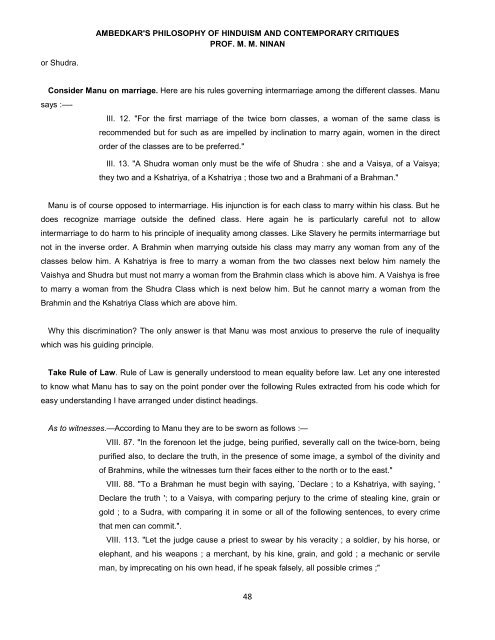Ambedkar-Philosophy of Hinduism
You also want an ePaper? Increase the reach of your titles
YUMPU automatically turns print PDFs into web optimized ePapers that Google loves.
AMBEDKAR'S PHILOSOPHY OF HINDUISM AND CONTEMPORARY CRITIQUES<br />
PROF. M. M. NINAN<br />
or Shudra.<br />
Consider Manu on marriage. Here are his rules governing intermarriage among the different classes. Manu<br />
says :—-<br />
III. 12. "For the first marriage <strong>of</strong> the twice born classes, a woman <strong>of</strong> the same class is<br />
recommended but for such as are impelled by inclination to marry again, women in the direct<br />
order <strong>of</strong> the classes are to be preferred."<br />
III. 13. "A Shudra woman only must be the wife <strong>of</strong> Shudra : she and a Vaisya, <strong>of</strong> a Vaisya;<br />
they two and a Kshatriya, <strong>of</strong> a Kshatriya ; those two and a Brahmani <strong>of</strong> a Brahman."<br />
Manu is <strong>of</strong> course opposed to intermarriage. His injunction is for each class to marry within his class. But he<br />
does recognize marriage outside the defined class. Here again he is particularly careful not to allow<br />
intermarriage to do harm to his principle <strong>of</strong> inequality among classes. Like Slavery he permits intermarriage but<br />
not in the inverse order. A Brahmin when marrying outside his class may marry any woman from any <strong>of</strong> the<br />
classes below him. A Kshatriya is free to marry a woman from the two classes next below him namely the<br />
Vaishya and Shudra but must not marry a woman from the Brahmin class which is above him. A Vaishya is free<br />
to marry a woman from the Shudra Class which is next below him. But he cannot marry a woman from the<br />
Brahmin and the Kshatriya Class which are above him.<br />
Why this discrimination? The only answer is that Manu was most anxious to preserve the rule <strong>of</strong> inequality<br />
which was his guiding principle.<br />
Take Rule <strong>of</strong> Law. Rule <strong>of</strong> Law is generally understood to mean equality before law. Let any one interested<br />
to know what Manu has to say on the point ponder over the following Rules extracted from his code which for<br />
easy understanding I have arranged under distinct headings.<br />
As to witnesses.—According to Manu they are to be sworn as follows :—<br />
VIII. 87. "In the forenoon let the judge, being purified, severally call on the twice-born, being<br />
purified also, to declare the truth, in the presence <strong>of</strong> some image, a symbol <strong>of</strong> the divinity and<br />
<strong>of</strong> Brahmins, while the witnesses turn their faces either to the north or to the east."<br />
VIII. 88. "To a Brahman he must begin with saying, `Declare ; to a Kshatriya, with saying, '<br />
Declare the truth '; to a Vaisya, with comparing perjury to the crime <strong>of</strong> stealing kine, grain or<br />
gold ; to a Sudra, with comparing it in some or all <strong>of</strong> the following sentences, to every crime<br />
that men can commit.".<br />
VIII. 113. "Let the judge cause a priest to swear by his veracity ; a soldier, by his horse, or<br />
elephant, and his weapons ; a merchant, by his kine, grain, and gold ; a mechanic or servile<br />
man, by imprecating on his own head, if he speak falsely, all possible crimes ;"<br />
48


















